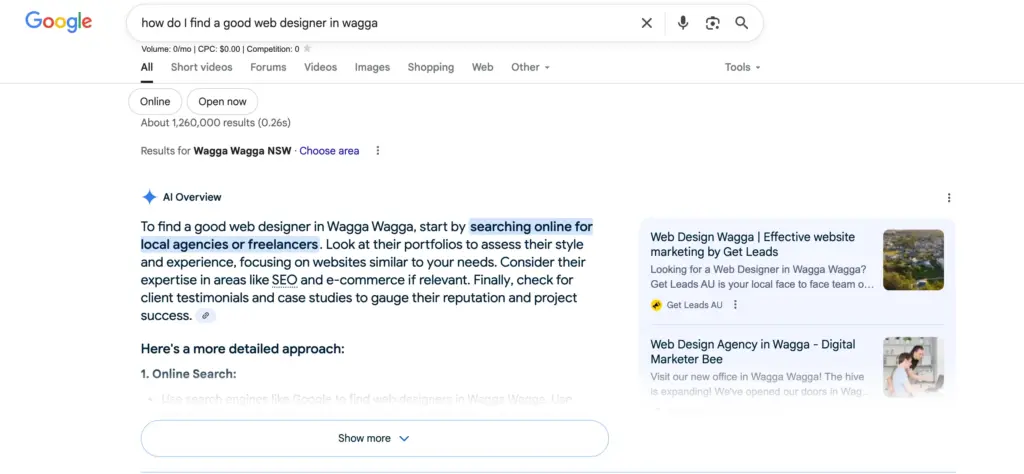How to Optimise for Google’s AI Overviews
Over the last six months, we’ve seen significant changes in search engine results for users, but none so significant as the AI overviews which answer our questions without the need to take the next step to go to any website and read more. It’s a fundamental change in how information is presented and consumed. Therefore, if you’re looking to thrive in these new search changes, it’s essential you understand some strategies that can be implemented to prioritise your content towards Google’s “improved” algorithm.
While there’s been a lot of discussion in the SEO community about AI ‘stealing’ traffic, it really depends on your website type whether you’re affected.
The below represents the highest expected impacted to the least.
- Informational: Most highly affected (think publication websites or wiki sites – paywalls play a part here)
- Commercial: Think your business websites.
- Transactional: Think ecommerce or booking type websites.
- Navigational: Think you need to login to access a set of services or downloads.
People ask questions when they’re at the top of the sales funnel to get a general broad understanding. People ask for a specific business name or the best business when they’re searching further down the sales funnel which generally do not need an AI search overview to assist with that knowledge.

Does your website answer the questions users might have? For the most part, the answer may well be “no.” Simple small-business websites rarely have blogs, and often lack the detailed FAQs needed to take advantage of being listed in the Google Search Overview.
Do you think business websites are headed for the scrap yard based on this specific AI search overview innovation? Clearly not, their information is needed to drive these, it’s simply a new opportunity to get more traffic and for those that have had blogs and news in the past, it may even lead to new challenges.
Get Leads manages over 160 websites and out of those 160 we have a total of 5 that have regular blogs 3%. We’ve also seen people adopt a blog and then abandon it in favour of social media posting instead of doing both. To my knowledge we’re not seeing search ai overviews including any social media posts.
This article is probably more for those of you have just started a blog or FAQ section and desire to grow their traffic.
What are Google AI Search Overviews?
Historically, we’d turn to Google to start our research journey, if we’re interested in knowing more about how to brew the best coffee similar in taste to Starbucks or how can I build a property portfolio. We’d then link to several websites and read what they had to say. Google AI Search Overviews goal is to take that extra step out for you and present you with the best answers inline with your search results.
Google AI overviews are summaries often compiled from multiple different sources, not always the top ranking to give you a direct answer and explanation. They’re not just feature snippets, as we’ve seen before, which may offer a simple definition. They’re a monumental leap in indexed data to information formatting and presentation served up exactly the way we like to consume our information.
Why is it important to understand AI Overviews?
- They’re given the highest priority possible against search listings. They stand out far more than anything else presented to us in our Google Search.
- About 10% (1 in 10) of keyword searches from a sample of 46,000 keywords have AI overviews. Source: Moz
- Even more than that, Search Engine Journal reports that out of all searches on Google 47% show AI overviews. The longer the keyword involving long-tails the higher still. Source: Search Engine Journal
- The correlation between search overview results and organic results see only 52% of the same results showing up in the top 10 for organic search which is mind boggling. It would seem the AI search is not utilising the same algorithm principles of domain or page authority.
Source: Moz - We’re being trained to search differently, and we don’t even know it. Getting an answer to your question without having to do a single click is a dream for our inherent laziness. We call it being efficient and saving time. If your site is referenced by AI summary it also builds authority for your website and helps to “maybe” lead your visitor to your site at a later date.
- Google’s summaries are continuing to develop and grow with intelligence. It’s a testament to what’s coming with the demand for more “immediate” experiences. An area that Google has also felt threatened by, imagine if they did nothing Google would be overtaken by others who were embracing AI or we’d find most users using ChatGPT to get the answers instead. I do this already to be honest and prefer getting my answers from ChatGPT. Personally I’d prefer Google do what it does best, search.
What seems to matter for AI overviews?
Address user intent clearly and concisely
- Answer the implicit question without unnecessary detail. Understand the “why”, there is often a different reason for the “why” that needs a bit more understanding. “why” could be they need a simple definition or researching a solution to a problem, doing a comparison or creating a guide themselves? It’s the underlying intent that matters most.
- If you’re trying to answer someone’s questions on a website by way of FAQs or content posts then have the answer they’re searching for in the first paragraph. Don’t tell a story, go straight for the answer.
- While your answer might be short and to the point, you need to develop content like it’s a package or module that get’s more detail as you go further and further. Think question, answer, summary, detailed response (including evidence and references).
Prioritise Clarity and Accuracy of content
Is your source trustworthy or is it simply non-factual, subjective? Could your language be open to interpretation? Be clear and direct—unless you’re writing an opinion piece.
I often will tell people how terrible some of the DIY builders are and how they don’t actually save anyone money and are not simplifying the building of a professional website. This is my opinion which has been logically concluded from my 20+ years experience and even some first hand experience actually using these tools. Still my brand and online profile are taken into consideration as if they are trustworthy or not. One reader will agree 100% and the next completely disagreeing making it still subjective despite providing data to back things up. The same sorts of arguments will be put forward against WordPress based websites and the ongoing maintenance requirements.
Without sources of information, Google may see my content as subjective and not necessarily accurate in everyone’s eyes. As I referred to previously I can cite other sources that talk about the face only 50% of these sites ever see the light of day and that most take between 3-6 months to build. This gives me more factual precision but even then how good are my sources? If I’m referencing subreddit spaces where the so called “professionals” hang out and I note there’s a lot of beginners in this area. Is this a reliable source of information. Well Google seems to think so, over the last two years subredit pages have had a higher authority in some areas of search.
Practical Strategies for Optimising Content
Use Structured Markup (sorry technical)
If you are hungry for more traffic, structured data is giving Google a detailed map of your content. In the past, we’ve done this with sitemap.xml or META information but schema does add extra information that Google can assimilate.
- What is it? Schema is additional markup usually in an attached json file or inline with the HTML. It allows you to take your piece of content more precisely as an article or FAQ.
- How it helps AI Search Overviews: It labels the type of information it is eg. Article, FAQPage, Org. It will often place the information into data extractable fields more easily readable.
- How can you test? Go to schema.org enter your URL, and it will give you any schema which has been applied to your website.
DIY builders, while some basic schema exists by default in SquareSpace and Wix you’ll have to implement some technical manual work arounds to get your platform to play properly in this space. Like most things with these builders you don’t have full control to implement exactly what’s needed in a lot of cases.
Optimise for featured snippets and answer boxes
These are not specifically AI overviews but are also inline information pieces on our search pages that also bring us extra traffic. There are however some similarities when considering the “why” intent.
If you search for a potential keyword you’d like to target and you see a snippet for this result you can often examine the source structure and create your own to submit to Google. How does the headings, paragraph appear in the source and what related search terms are at work here?
Listical’s work well here for targeting these types of answers usually at the very start of the page. If the query is “What is javascript?” then provide a definition. If it’s a “How do you do Javascript” then provide a step based approach as brief as possible which typically works with specific terms and not general topics like the one I’ve chosen above.
Comprehensive Topical Silos or Content Hubs
This is very much an SEO term but being comprehensive in a specific area builds your authority. You can mix this up with geographical relevance as well and pillar pages which you link to as your primary goal to drive users to that page through internal link strategy. Social media and off-site marketing also play a part here in giving that page authority to be used by a Google Search AI Overview. As you can see this is not so different to a blog based SEO strategy. Just want to say, I’m not a fan of the “Content is king” phrase and would much prefer “backlink authority” involving links from other sites to your site.
Clear Headings and Subheadings
“I love structure because I’m human and funny enough, so does Google.“
- Always ensure you have a semantically correct heading hierarchy. Visually, it’s easy to read and also makes more sense to Google. What I mean by this is your heading 1 should be the biggest going down to a heading 5 however usually I concentrate on the first 4. You can check this using a chrome extension or plugin like Detailed SEO extension.
- Incorporate keywords into headings which have always been important to get content to rank. Now it’s also just as important to target Content Search AI.
Answer Common Questions Directly
Put yourself in your customers’ shoes and note the common questions they ask and questions around that topic?
- FAQs sections are great for this at the end of a page or contextual on a specific service page.
- Questions as headings when discussing a topic will stand out to your Search bot.
- “People Also Ask” type research will give you the related searches so you can target a more refined set of keyword terms. If you don’t know what I’m referring to here do a search and then scroll down to the bottom and you’ll often find a “People Also Asked” section.
Optimise for conversational search
To answer questions that are back and forth, type logical sequences. AI overviews excels in this area and follows the patterns on how people speak.
- Long tail queries or keywords: Often we’ll do a search and then need to be more and more specific if there’s too many results. It’s important to know what long tail queries are available to you. This could simply be location based such as my old favourite “Web Designer Wagga” Topic + Location long tail. But in general we might start with a search such as “my car has a noise” then “my car has a noise in the front wheel” then “my car is a ford ranga 2021 model and it has a grinding noise in the left wheel” in order to get the correct answer. The more detail the better for Google.
- Natural Language: Write your content in a conversational tone where it’s appropriate, using full sentences and addressing the user directly. It will make it easier for AI to understand within the context of other sentences and to provide a robust relevant answer.
- Prepositions and question words: Especially these types of phrases will win at search AI “What is”, “Why does”, “How can”, Where can I”.
Site speed and mobile-friendliness
Whilst most of you are saying how can this possibly relate to content. Though it may seem unrelated, technical site factors deeply affect content discoverability and the ability for a website to be searched quickly and easily and for users to read content easily. As noted previously in this article just because you have a healthy website with loads of authority doesn’t mean concentrating on the below factors will get you into the AI search snippets with only 52% of sites having an organic cross-over. Please note though this figure climbs significantly when looking at preview links which are slightly different but also generated within the search overview space.
- Tools like PageSpeed that will test your core web vitals will assist in making a difference to your site load time but I’ll warn you unless you want to get technical then I wouldn’t bother as there’s hours and hours of time that could be spent here and the investment isn’t as useful as getting that all important backlink from a contextually relevant site.
- Mobile Friendliness: yes, it’s all about usability on different devices and AI search will craft different results for mobile vs. desktop.
Tools and Techniques for Monitoring
Setting your site up for search AI overviews is one thing seeing the needle move is another. Most web designers and developers will avoid when you ask them to provide the search volume differences for from before and after work has taken place. There’s too many variables they might say, Google changes it’s algorithm and the fact your site tanked is nothing to do with the fact they forgot to setup 301 redirects.
Something I see all the time from particular the DIY builders. I get more inquiries about increasing serach visibility from this crowd than any other area.
Take matters into your own hands and know where your search profile is at with tools like searchfox or keywords everywhere you can check where you’re at.
Google Search Console
This is your main free tool from Google which will:
- Allows you to see what keywords are displaying an impression of your site.
- It also allows you to see what rich search features you might be targeting on a specific page.
- See when our site was last searched and indexed by Google and allow you to submit it for indexing.
It’s under utilised by clients not really even knowing it exists or what it does. Instead the main tool that has most of the attention is Google Analytics.
Other SEO tools
- Keywords Everywhere is a cheap inexpensive tool that will display a number of metrics within your search results. It’s a great tool I can recommend to all my clients. It shows search volume, difficulty to rank for a keyword. Any trends over 12 months for a keyword set, what your competitors are doing with a keyword and the structure of their page for example META, title, url keyword inclusions.
- Moz, SEMRUSH, Ahrefs are a few others but we’re all of a sudden looking at $120+ per month. These tools are generally used by people like me who have more time in the SEO area and work with SEO contracts.
How do you analyze Search AI Overview
- Do a relevant keyword search and check to see who’s showing up. A regular check on this area will help you know who out of your competitors are leveraging AI.
- Source Attribution: Google cites sites specifically within the AI Overivew. Why did they choose that competitor over you? Was the page better structured or did it contain more relevant keywords or was it referenced by other various sources such as LinkedIn.
- “People Also Ask”: changes over time but is in effect AI determining based on it’s knowledge what people have been searching. Answer these questions if you can within your FAQs and content blog.
How to stay on the cutting edge of AI Search?
There’s a few references and call out to sites I’ve referenced above. If you’d like to stay on top of your SEO knowledge in Search AI these are some pretty good sources of truth while in actual fact Google holds the truth close to it’s chest:
In Summary
As I said at the start of this article, AI search overview is an opportunity. It does not eliminate the need for a business website although probably some more than others.
I’m sure there’s been things in the article you may not agree with. Please send me a message and open up a conversation about your website goals for 2025 and where you think opportunities might begin.
Update 5 November 2025
New Google AI Search schema search tool created on our Get Leads Australia website that will allow users to test their own websites. I’ve launched this via Google Ads campaign together with a security testing tool






